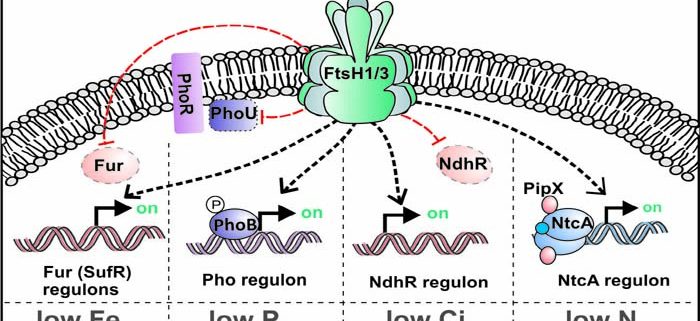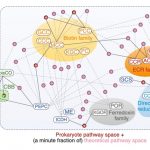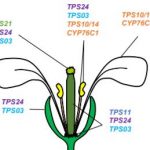Proteases Help Cyanobacteria Survive Nutrient Starvation
Krynická et al. uncover the critical role of the FtsH1/3 protease complex in the acclimation of a model cyanobacterium to nutrient stress. Plant Cell https://doi.org/10.1105/tpc.19.00411
By Vendula Krynická1,2 and Philip J. Jackson3,4
1Centre Algatech, Institute of Microbiology of the Czech Academy of Sciences, Czech Republic
2Faculty of Science, University of South Bohemia, Czech Republic
3Department of Molecular Biology and Biotechnology, University of Sheffield, UK
4ChELSI Institute, Department of Chemical and Biological Engineering, University of Sheffield, UK
Background: Cyanobacteria survive in almost all habitats owing to their ability to adapt to a wide range of environmental conditions. These organisms have evolved remarkable mechanisms that help them respond to rapid environmental changes. They are able to activate or suppress the production of proteins that are important for nutrient stress acclimation, such as nutrient-uptake proteins. Protein production is two-step process starting with transcription, where the protein-coding gene (a DNA sequence) is copied into mRNA. The mRNA sequence is then translated into a protein. In cyanobacteria, the regulation of protein production mainly functions at the level of transcription, and many other proteins are involved to form a complex regulatory network. One key component of this network, which accelerates the production of many nutrient stress-inducible proteins, is an FtsH protease complex.
Question: It was shown that an FtsH1/3 protease complex is involved in the response to iron depletion in the model cyanobacterium Synechocystis PCC 6803. We wanted to know whether the role of FtsH in nutrient stress acclimation is more general than previously thought. Besides iron, we focused on phosphate, carbon, and nitrogen starvation.
Findings: We discovered that the FtsH1/3 complex is important for proper acclimation of the cyanobacterium to nutrient stress, namely to iron, phosphate, carbon, and nitrogen starvation. When we reduced the level of the FtsH1/3 complex, the cells were not able to produce proteins such as nutrient-uptake proteins that help them cope with stress. On the other hand, when we increased the amount of FtsH1/3 complex, these proteins accumulated unnecessarily in the cell. FtsH controls the production of these nutrient-uptake proteins at the level of transcription. We believe that under nutrient starvation, the FtsH proteases digest transcription factors, the DNA binding proteins, which in times of plenty would otherwise prevent the transcription of nutrient-uptake proteins.
Next steps: We aim to increase our understanding of the mechanism of FtsH action in the transcription process. Additionally, we would like to determine whether the role of FtsH in nutrient stress acclimation is common to other species.
Vendula Krynická, Jens Georg, Philip J. Jackson, Mark J. Dickman, C. Neil Hunter, Matthias E. Futschik, Wolfgang R. Hess, Josef Komenda (2019). Depletion of the FtsH1/3 Proteolytic Complex Suppresses the Nutrient Stress Response in the Cyanobacterium Synechocystis PCC6803. Plant Cell. https://doi.org/10.1105/tpc.19.00411.
Key words: nutrient stress, Cyanobacterium, protein quality control




